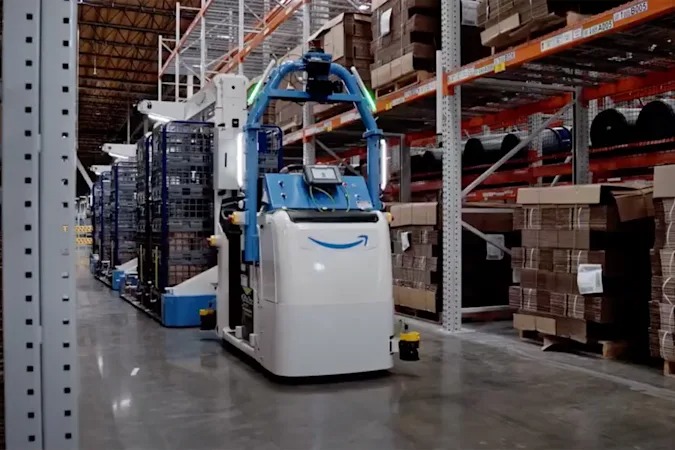
In May, Amazon announced its goal of reducing employee accidents by 50% at its logistics sites and announced that it would invest more than $300 million in its safety project, Working Well, this year. Next, according to the blog, Amazon is investing its budget in introducing four robots that share warehouse tasks rather than improving the employee environment.
First, Ernie unloads the luggage on the warehouse shelf. It is responsible for unloading the cargo carried in the cart from the heavy container and placing it on a conveyor or workbench. Although it is not a reduction in working hours for employees, it is explained that such work itself places a heavy burden on the body and can lead to improved safety.
Next up is Bert. It is a transport robot that can crawl under a container with loads, pick it up, and move the warehouse autonomously. It’s one of the robots that Amazon has announced to develop, and since it has no limits on its range of motion, employees can leave Bert to carry heavy cargo.
Both the Scooter and Kermit are transport robots that employ devices commonly found in factories that are somewhat automated and move on tapes pasted on the floor. A scooter is a towing robot that loads and transports a basket-type vehicle commonly found in supermarkets, etc. on a low-floor carrier. Kermit collects empty containers and returns them all at once.
The introduction of robots into the workplace raises the question of whether there will be workers who will be laid off due to the loss of human work. Efficiency and hiring issues aren’t unique to Amazon, but Amazon is emphasizing that adopting robots can help employees focus on their most important tasks, which can also minimize patient injuries.
However, these efforts can lead to criticism that they say they are improving the working environment, but that they rely too much on technology. The introduction of technology is not suited to the direction of improving the situation of overuse of employees at Amazon’s logistics site. Amazon, for example, has been criticized for retaliating against an employee who expressed concern over a disregard for workplace safety when the outbreak began last year in New York State. In addition, CEO Jeff Bezos, who is currently preparing to step down as CEO, spoke in defense of a unique policy that could cause disasters by imposing restrictions on daily activities outside of working hours for logistics field workers. Related information can be found here.






